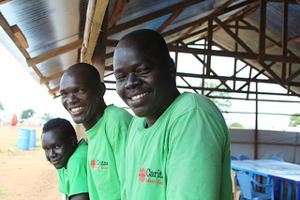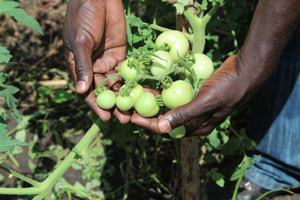
Caritas volunteers at a transit camp for people returning to South Sudan from Sudan. Here, Caritas works with the International Organization for Migration (IOM) and other groups to help families who are about to start a new life in the newly-created country. With funding from Caritas members worldwide, Caritas Juba has mobilized volunteers to construct IOM tents, distribute items like mosquito nets, and provide hygiene training to camp residents.
Credits: Sheahen/Caritas
On the road in South Sudan, landmine warnings flash by and demining groups work on unexploded bombs left over from war. But in a vehicle full of Caritas workers, the passengers are more worried about the insects flying around. Are they mosquitoes? Tsetse flies? The vehicle splashes through puddles where snails and worms live that can make you very ill.
Almost every bad tropical disease you’ve heard of is found in this corner of East Africa. And nearly every problem a country can face is here: violence from within and without; almost no water systems, paved roads, electricity, schools or clinics; war orphans and war widows; half a million returnees with no homes; thousands of guns in the hands of armed groups. South Sudan, the world’s newest country, has it all.
It has it all in a better sense, too: rich fields, plenty of natural resources, the blessing (or curse) of oil. It has a people who became independent on July 9th of 2011. They no longer face a decades-long civil war or life as refugees or second-class citizens.
The war cost millions of lives. The fight to make the nation succeed will be difficult too. “People died here last autumn of hunger,” said Fr Biong Kwol, a priest who works in a northern border area. He points at a nearby tree. “They were eating these leaves,” he said.
Staving off hunger shouldn’t be a challenge in a country with coal-black, incredibly fertile soil. But the war disrupted farming as people fled bombings and bullets.
“People here would run to the mountains during the civil war,” said Peter Lomude, who works for Catholic Relief Services (CRS is a Caritas member) in the south-eastern part of the country. Some of them weren’t farmers to begin with. “Before, these people were cattle herders, they don’t have a farming mindset,” he said.
Landmines prevented some families from growing food on the rich land. Despair set in when families saw their work destroyed by armed groups like the Lord’s Resistance Army (LRA).
“You’d have done everything properly—sowing, weeding, harvesting, storing—and then the LRA would come and burn it,” said Peter Lomude. Even when people did harvest a crop, the food didn’t always last through the lean season. “At certain times of year, people are really feeble and weak,” he said.
Hunger is just one threat. “People were taking water from the streams, but it wasn’t healthy,” said Haddish Desta of Caritas Luxembourg. He works in a south-eastern town called Torit. “There would be diarrhoea, typhoid.”

In South Sudan, Caritas trains farmers, provides seeds, creates water systems and runs other projects to help families grow enough food to feed themselves.
Credit: Laura Sheahen/Caritas
Malaria, snail-borne schistosomiasis, or sleeping sickness caused by tsetse flies are common, but getting proper care is often impossible. People walk long distances on dirt roads that often turn to mud. There are few cars and there is a petrol shortage; South Sudan has plenty of oil but no refineries to process it. (And because Sudan controls the refineries and rights to the oil are being disputed, all production is currently on hold.)
If you make it to a clinic, it’s not likely that you’ll get what you need. “People have prescriptions,” said Fr Biong Kwol, “but clinics don’t have the medicine.” For women about to give birth, South Sudan has one of the highest maternal and infant mortality rates in the world.
Then again you could simply get shot. South Sudan is awash with guns. Even though the war is over, conflict is endemic.
“People are still very angry. If they fight or disagree, they’ll use a gun,” said Fr Lounoi Santino in Torit. There is a bullet hole in the driver’s-side headrest of his church van; he was driving the car when it happened. “I lay sideways and kept going,” he said. The shattered glass from the window cut his head, but the bullet missed. He still doesn’t know who was shooting at him.
Into this mix, people are streaming back. Families who fled in the night on foot, those who were stuck for years in refugee camps or way stations, are returning voluntarily or not-so-happily to South Sudan.
Widows and women whose husbands are still in the military are taking care of orphaned relatives, as well as their own children. Pia Angiye Kiwa has more than a dozen children to feed, some of them her brother’s. She battles dangerous snakes and the scepticism of neighbours as she tries to improve her farm. She is getting seeds from Caritas Switzerland and Caritas Luxembourg.
Ater Malak, a father of four, is waiting with about 8000 other people in a transit camp near Juba, the country’s capital. Like many families, they’ve been out of the area for so long that they don’t have close relatives in South Sudan. For now, they can stay in tents built by volunteers of the fledging Caritas South Sudan, a new Caritas for the new country. But looking toward the future, the Juba camp residents don’t know where to go.
“The challenge for South Sudan is to build up the country from scratch,” said Martin Jaberg of Caritas Switzerland in Torit. “There is nothing.” Even the tiniest issues become showstoppers: for lack of the right pipe fitting, thousands of people go without clean water. So in addition to its main projects fighting hunger, water scarcity, malaria and disease in South Sudan, Caritas Switzerland works to get spare parts.
Rita Amone, age 26, returned to South Sudan in 2006, before independence. She spent her teen years as a refugee in Uganda. “When we first came back, it was really hard. There was no food in the market, and there was a problem in getting tools and seeds,” she said.
Rita received a good education in Uganda, something she’s trying to pass on as a primary school teacher in her town, Isoke. She’s paid very little and it’s never certain that South Sudan’s government will meet its salary payrolls at all. “We have to help our people, salary or not. We have to give knowledge to the children,” she said. The country has potential, but “there are no people to lift it up.”
“Where else can we go? This is home,” she said, gazing at her town. There is an unexploded bomb in the river near the primary school, a small poorly-supplied medical centre, impossible roads and acres of tall grass that need to be cut down by hand before anyone can farm. “We have to build a country,” she said, “No matter how hard it is.”
